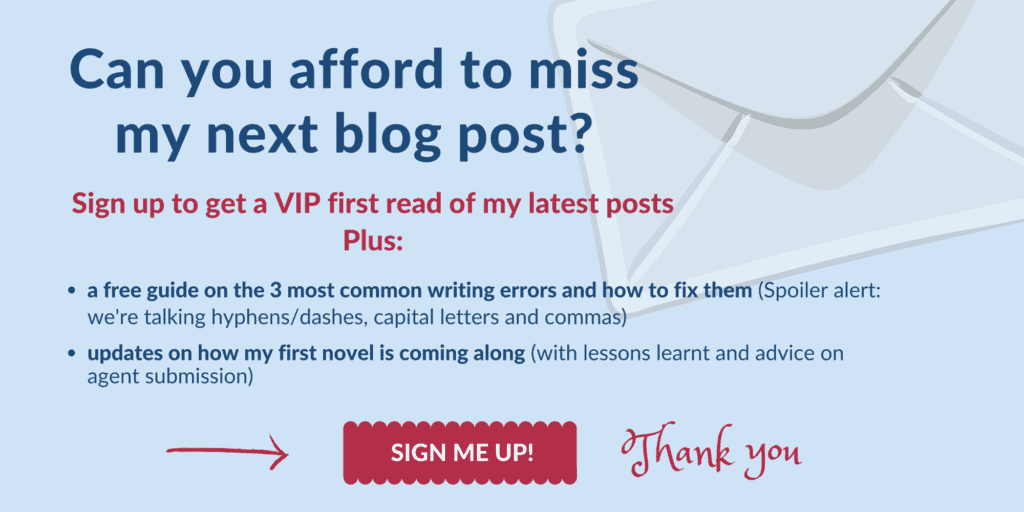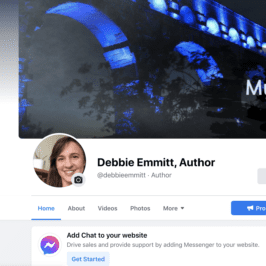
I recently sent off my manuscript for a sensitivity read. Find out what this important service is and why your book may need one.
A few weeks ago, I sent my work in progress to a sensitivity reader (also known as an authenticity reader). He did a fantastic job evaluating it and provided me with detailed feedback, including both positive points and areas to ponder.
Since telling people about this, fellow authors have been asking me questions about the service. This article answers the most common ones (the ‘frequently asked questions’, if you will). If it doesn’t answer yours, plonk it in the comments!
What is a sensitivity reader?
A sensitivity reader, or authenticity reader, is someone who reads a manuscript that include experiences or identities outside the author’s lived experience. They read it specifically to look out for unintentional bias, stereotyping, offensive content or clichés.
Different sensitivity readers will pay attention to different areas, for example:
- Cultural inaccuracies
- LGBTQ+ representation
- Ethnic diversity
- Representation of medical conditions or disabilities
This list is just a tiny example of the kinds of things an authenticity reader may look out for. Depending on your story and characters, you may need a sensitivity reader who has knowledge or experience of a very particular aspect of life.
Does my book need a sensitivity reader?
If one or more of your characters is of a different sexual identity, ethnic background, skin colour, religion (or other characteristic) to you, then it’s advisable to hire a sensitivity reader.
My book contains LGBTQ+ characters and themes. As this is outside the realm of my personal experience, I was in no doubt that I needed someone to read it through that lens, to ensure that I am not inadvertently offending, misrepresenting or causing emotional pain to anyone.
This great article by Juno Dawson on The Guardian website does a great job of explaining why sensitivity readers offer an essential service.
What if my character is meant to be racist/homophobic/sexist?
This question highlights a common misconception about what sensitivity readers do. They’re not the book police, cracking down on every single instance of racism, homophobia or sexism. Depending on how these aspects are incorporated into your story, they may have a place there.
BUT, and this is the key thing, the reader needs to know that, although a character may be hurling racist abuse, this is not the view of the author. This can be achieved in many ways, including:
- the character with the unsavoury views gets their comeuppance
- characters holding such views are argued against
- the racist/sexist/homophobic character doesn’t ‘win’
- inclusive/feminist/diverse viewpoints are held by other characters
- the victim of any physical or verbal abuse eventually ‘wins’ in some way
Isn’t this quashing free speech?
No. Free speech is one thing, but offending people without even realising you may be doing so is a whole other ballgame. I, for one, would rather know before I publish if I’m unwittingly including harmful stereotypes, clichés or vocab in my book. I want my readers to lose themselves in my story, not feel upset or angry because I’ve clumsily included a word, phrase or representation that is hurtful to them.
Hiring an authenticity reader is NOT preventing free speech. It’s getting perspective on your work, seeing it from an angle that you never could yourself, due to your possible unconscious bias and lack of experience of a particular race, religion or sexual identity. Besides, they are offering suggestions from their perspective; it is up to you whether you implement their advice.
Hiring an authenticity reader is NOT preventing free speech. Share on X
How can I find a sensitivity reader?
There are different ways to find the right sensitivity reader for your book, depending on your budget and the kind of reader you need.
First of all, if you already have a publishing deal, the publishing house may provide this service as part of the deal. Find out before you spend time and money looking for someone.
Your personal network
If you are self-publishing on a shoestring, you may know someone in your network or friendship group who fits the demographic you are seeking advice about. Asking if they could possibly spare the time to read your book and offer feedback is an option. However, bear in mind the following:
- Reading a book is a considerable time investment, so you’re asking a lot from a friend. Consider paying them in some way. If money isn’t an option, how about a trade of services, or a small thank-you gift?
- A friend may not be as honest as an impartial reader, due to protecting your feelings.
- Professional sensitivity readers will give detailed feedback and know exactly what to look out for. People in your personal network may miss important elements.
Beta readers
If you don’t feel you can afford a professional sensitivity reader and are sending your book to beta readers, consider selecting one or two who align with your characters in some way.
While beta reading is not the same as sensitivity reading because your beta readers are not honing in on that particular element (they’re also looking for potential plot holes, and generally seeing if the story ‘works’ for them), their feedback may give you some idea as to how authentic your characters are and if there are any red flags.
Carefully chosen beta readers can give you some idea as to how authentic your characters are and if there are any red flags. Share on XOther places to look
If you have the budget to hire a professional authenticity reader, you need to find the right person for your book, character/s and plot. Find someone as near to your character’s identity as possible, to get the most authentic perspective and useful feedback. Try to match as closely as possible gender, sexuality, ethnic background and/or disability.
Some places you can look for a sensitivity reader include:
- Fiverr
- Upwork
- Writing Diversely directory
- Google search (use specific terms for the reader you need, rather than just “sensitivity reader”)
How much does a sensitivity read cost?
The cost of a sensitivity read, or authenticity read, varies widely, from zero pounds or dollars (e.g. if a friend does it) to several hundred.
Have a look at the sources that I’ve provided above and see what people are charging. Make sure you check reviews and testimonials to ensure you are giving your money to someone who will do a thorough job. Otherwise, no matter how reasonable the service may seem, you could be throwing your money away.
If you can’t afford a sensitivity reader for your entire book, consider whether there are only a few scenes that involve the character in question. You may only need a few chapters or pages checked, which would work out significantly less expensive than hiring someone to read your whole book.
Do I need to act on all the advice from my sensitivity reader?
Your book is your book. Just like suggestions made by editors and proofreaders, it is your decision whether or not to act on them all. Some will clearly require immediate changes, others may need more pondering.
A sensitivity reader can only give you their perspective, based on their experience. This leads me on to a criticism I often read about authenticity readers, namely, that one person can’t speak for a whole community; that it’s (ironically) insensitive and naive to assume that the experience, for example, of one woman who uses a wheelchair is the same as all women who use a wheelchair.
Of course this is true, but it’s no reason not to hire them. They will raise points that you will have never considered alone, as they have experienced the world from a place where you have never been. Read their feedback with your brain engaged and use your judgement to decide whether each point requires changes to your manuscript.
A sensitivity reader will raise points that you will have never considered alone. Share on XOver to you
Do you think your book may need a sensitivity reader? Have you ever hired one? What was your experience? Let me know in the comments!









Bethany Rossiter
My wip will need a sensitivity reader and I have already got someone in mind who’s been incredibly helpful already. I have 2 gay mc’s living in 1920 so the historical element is something I want to get right.
My question is though, at what stage of your writing journey did you hire a sensitivity reader? I’ve been told hiring one before beta reading takes place is a good idea, but I initially thought after would be better.
Also, how far in advance did you book yours? I don’t want to get to the stage where I need one only to find everyone is fully booked up!
Debbie Emmitt
Hi Bethany, I went through the beta-reading stage first, then hired a sensitivity reader, but that wasn’t really a conscious decision, just how it panned out. As sensitivity readers are a kind of beta reader, looking out for something quite specific, I’m not sure it makes a lot of difference in which order you do it. If anyone else has any suggestions, feel free to drop in your view!
As to how far in advance you book them, it will depend very much on the reader’s schedule. Nick, my sensitivity reader, is booked up far in advance for full-blown editing/proofreading projects, but he is able to fit in the sensitivity reads around his editing work. If you already have someone in mind, I’d suggest you have a chat with them about their availability. Good luck!
Jane Dunning
Hi Debbie
I self-publish so sent questionnaires to my beta readers. One of the questions was roughly ‘could the conversation about the Serbian characters be construed as racist?’. One felt it could so I toned it down a little. To be honest, I’d never heard of a ‘sensitivity beta reader’ so I’m pleased I kind of covered it!
I also have a male gay proofreader and a straight older female proofreader who checks the French too.
Fascinating stuff – thank you.
Best regards Jane
Debbie Emmitt
Hi Jane, sounds like you’ve got a few bases covered via your beta readers, great stuff! I’m glad you found the post useful.
A sensitivity reader is more than a beta reader, as they are experienced in reading books specifically for issues regarding the authenticity of specific characters, regarding race, religion, sexuality, gender, and more. They usually also provide you with a report that details what you’re doing well and what could be improved. Authors tend to decide to hire a sensitivity reader if they have a character or theme that features prominently in the story, that is outside their experience.
This service doesn’t always have to be for minority characters. For example, a male author writing a female character would be advised to hire a female sensitivity reader to ensure their character is authentic. I recently read a novel with a female protagonist, and a female author’s name on the cover, but strongly suspected that the author’s name was the female pseudonym of a male author, because many of the things the character said and did just didn’t ring true. They felt quite stereotypical of things that men may think women feel etc. When I googled the name, I discovered my suspicions were correct! I won’t divulge the name of the author out of professional courtesy, but I doubt he asked for constructive feedback from a female sensitivity reader.